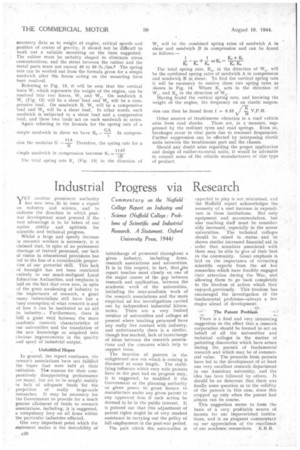Industrial Progress via Research
Page 36

If you've noticed an error in this article please click here to report it so we can fix it.
Commentary on the Nuffield College Report on Industry and Science (Nuffield College: Problems of Scientific and Industrial Research, A Statement. Oxford University Press, 1944) Yanother prominent authority has now seen, fit to issue a report on industry and science, and to indicate the direction in which postwar development must proceed if the hest advantage is to be taken of our. native ability and aptitude. for scientific and technical progress.
Whilst a large and speedy increase in research workers is necessary, it is claimed that, in spite of no permanent shortage of trained personnel, our lack of vision in educational provisions has led to the loss of a considerable proportion of our potential skill. This lack of foresight has not been restricted entirely to our much-maligned Local Education Authorities, and emphasis is laid on the lett that even now, in spite of the great awakening of industry to the importance of research, a great many industrialists still have but a hazy conception of what research is and of how it can be instituted as an aid to industry... Furthermore, there is still a great void between the more academic research characteristics of our universities and the translation of the new knowledge so acquired into obvious improvements in the quality and speed of industrial output.
Unfulfilled Hopes In general, the report continues, the research associations have not fulfilled the hopes that were held at their initiation. The reasons for their comparatively disappointing performance are many, but are to be sought mainly in lack of adequate funds for the projection of really large-scale researches. It may be necessary for the Government to provide for a much greater allotment of funds to research associations, including, it is suggested, a compulsory levy on all firms within the particular industries affected.
One very important point which the statement makes is the desirability of
interchange of personnel throughout a given industry, including firms, research associations and universities. It is in this respect, in fact, that bthe report touches most closely on one of the major causes of the gap between research and application, between the academic work of the universities. including the near-academic work of the research associations and the more empirical ad hoe investigations carried out by -independent industrial laboratories. There are a very limite4 ounaber of universities and colleges at present where teaching personnel have any really live contact with industry, and unfortunately there is a similar, though less marked, lack of interchange of ideas between the research associations and the concerns which help to support them.
The function of patents in the enlightened new era which is coming is discussed at some length. The stultifying influence which very wide patents have in the past had on progress may, St is suggested, be modified if the Government or the planning authority oe given power to grant licence to manufacture under any given patent to any approved firm if such action be deemed to be in the public interest. It is pointed out that this adjustment of patent rights might be of very marked assistance in carrying out the polity of full employment in the post-war period.
The part which the, universities is expected to play is not minimised, and the Nuffield report acknowledges the necessity of a vast increase in expenditure in these institutions. Not only equipment and accommodation, but also teaching staff must be considerably increased, especially in the newer universities. The technical colleges should be raised in status and be shown similar increased financial aid in order that scientists associated with them may be able to give of their best to the community. Great emphasis is laid on the importance of retracting scientific experts from the• ad hoc researches-which have forcibly engaged their attention during the War, and allowing them to go back completely to the fieedom of action which they enjoyed previously. This freedom has encouraged the investigation of the fundamental problems—always a few stages ahead of development.
The Patent Problem There is a final and very interesting suggestion to the effect that a research corporation should he formed to act On behalf of all the universities and technical colleges in the matter of patenting discoveries which have arisen during the pursuit of fundamental research and which may be of commercial value. The proceeds from patents have led to the development of at least one very excellent research department in one American university, and the idea has been followed by others. It should be no deterrent that there was finally some question as to the validity of the patents in this case, since this cropped up only when the patent had almost run its course, This suggestion seems to form the basis of a very profitable source of income for our impoverished institutions, and is an eloquent commentary on our appreciation of the excellence of our academic researchers. ERR




























































